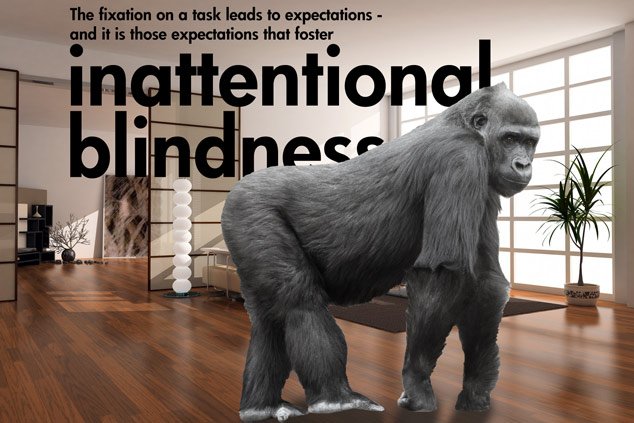Inattentional Blindness: How the majority can miss the illegitimacy of the state
In 2012-2013 I spent a year in the State of Washington at a wilderness school. Although we focused on many different skills and studies, the all encompassing theme was awareness. When looking for wildlife sign, oberving ecologies, seeking people in the woods, and trying not to be found, awareness plays an extremly important role.

Most do not stop to consider the strength or weakness of their awareness. In modern culture we have grown accustumed to not needing it. Our lives are dominated by situations that allow us, or even encourage us to have tunnel vision. While driving down the road, most people end up in a daze, seeing only the most important things in front of them in order to ensire a safe arrival. With our technology, a small lit screen gathers all of our focus and attention to a single point.
While having the ability to focus intently on one task or input is very useful in many cases, our ablity to notice the things we aren't expecting, the things just outside of our attention, is an equally important skill to maintain.
Our ancestors required this ability for their survival. While they certainly had an intense ability to consentrate on a given task, such as making stone tools, their skill for maintaining a sense of their surroundings kept them alive. It was crucial that they do so to both protect themselves from predators, and to act as a predator.
Inattentional blindness
Inattentional blindness, also known as perceptual blindness, is a psychological lack of attention that is not associated with any vision defects or deficits. It may be further defined as the event in which an individual fails to recognize an unexpected stimulus that is in plain sight. When it simply becomes impossible for one to attend to all the stimuli in a given situation, a temporary blindness effect can take place as a result; that is, individuals fail to see objects or stimuli that are unexpected and quite often salient.
In order to study this phenomeneon, Daniel Simons of the University of Illinois at Urbana-Champaign and Christopher Chabris of Harvard University created a test.
Here is the test.
On many occasions while looking for fox tracks I have nearly missed things (and would have if others weren't with me) that I find far more interesting. Sign of black bears, martens, and mountain lions.
However this phenomenon relates to us in a far wider variety of areas than my peersonal experiences with the outdoors.
Criteria for classifying inattentional blindness.
The following criteria are required to classify an event as an inattentional blindness episode: 1) the observer must fail to notice a visual object or event, 2) the object or event must be fully visible, 3) observers must be able to readily identify the object if they are consciously perceiving it,[1] and 4) the event must be unexpected and the failure to see the object or event must be due to the engagement of attention on other aspects of the visual scene and not due to aspects of the visual stimulus itself.[1] Individuals who experience inattentional blindness are usually unaware of this effect, which can play a subsequent role on behavior.source wikipedia
There are many government actions and events that take place that could fit this example. Yet I think that it most behooves us to use the most common and obvious example for the sake of example.
Taxation
- the observer must fail to notice a visual object or event
Of course people see taxation in action. However they fail to see it as theft defined
- the object or event must be fully visible
Again, no one fails to se taxation
- observers must be able to readily identify the object if they are consciously perceiving it
All people percieve taxation, but fail to identify it for what it is
- the event must be unexpected and the failure to see the object or event must be due to the engagement of attention on other aspects of the visual scene and not due to aspects of the visual stimulus itself
As an individuals attention is usually focused on the "good" things taxation is supposed to bring us. They fail to see the inherent robberey of it.
1Rock, I.; Linnet, C. M.; Grant, P.I.; Mack, A. (1992). "Perception without Attention: Results of a new method". Cognitive Psychology. 24 (4): 502–534. doi:10.1016/0010-0285(92)90017-v. PMID 1473333.0285(92)90017-v. PMID 1473333.riley@riley-HP-EliteBook-8570p:~/Dropbox/steemit$
Devils advocate: can't you just use that argument on anyone who doesnt agree with you about anything.
That is to say, you start with a thesis: tax is robbery. Then to back that thesis, you say that anyone who doesnt believe it has inattentional blindness. It would be just as easy for me to say
my dog is a cat. The preceeding statement is obvious. Therefore, if you don't think my dog is a cat, you must be experiencing inattentional blindness.
Also, the phenomenon youre describing seems to be limited to visual things. Failing to "see" that tax is robbery (failing to "see" the definition that is) isnt visual. Its just a turn of phrase.
Also, as a methphor it doesnt work. Because the thing you fail to see must be readily apparent. that is to say, if your inattentional blindness makes you blind to tax as theft, then the obvious thing must be that tax is theft not just that tax exists.
well I come at it from the standpoint that taxation fits the exact definition of robbery. It is robbery. There is no way to disagree with that. You can say it is "justified" but you can't get around the fact that it is still robbery. Most people however, simply don't see that is exactly what it is.